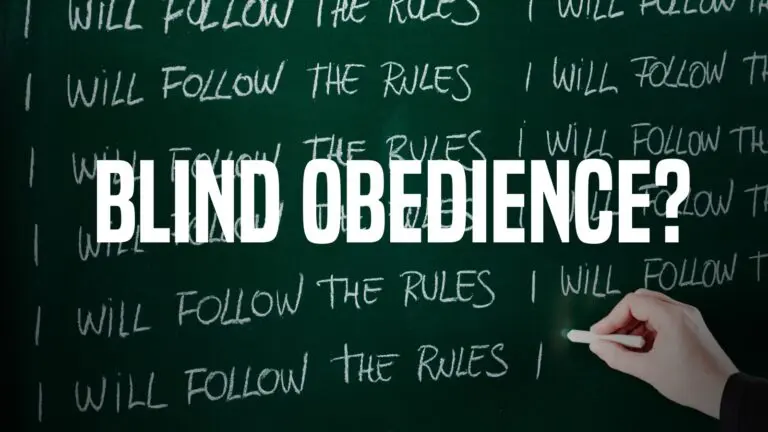
The simple answer to the question is No, of course not. And few would argue the point at all. Perhaps then the better question is To what extent does the Bible teach submission to the state? The surprising answer, on closer examination, is not all that much. Let’s dig in.
God created the universe, and man within it, with distinct and immutable existences, images, and laws defining their extents and limitations, rights, freedoms, liberties and constraints. These cannot be altered or intruded upon by others, nor should attempts to do so be made. Later came the nations. Any nation following God’s law will be blessed (Deuteronomy 28:1-14; Psalm 33:12), and any nation not doing so will be cursed (Deuteronomy 6:15-17.).
God as Creator set an established hierarchy into all things, He and His law standing at its peak. Man is not to alter or attempt to overthrow God’s order. Violating man’s incontrovertible rights is an affront to God – a devaluing of both God and man, saying God does not matter, and man has no worth – he is not created in God’s image, and can be redefined at any time, as another man may decide to declare. So, a government violating God’s laws for mankind is in rebellion against the King of Kings. Throughout history, God raised figures like Moses, Gideon, Ehud, Jephthah, Samson, Esther, and Deborah to challenge tyrannical governments and restore Israel under the kingship of God. These individuals are all commended in Hebrews 11.
Despite what some Christians may claim, God does not endorse rulers merely because they hold positions of power. Throughout history, until the 17th century, the church practiced the principle of “rebellion to tyrants is obedience to God,” which contrasts with the modern church’s blind, passive, even patriotic obedience to the secular state. Even within Israel, God in Hosea 8:4 states of his people “They set up kings without my consent; they choose princes without my approval.” Kings can commit abominations when they engage in evil acts (Proverbs 16:12; 28:15). Therefore, not everything they do is just or aligned with the will of God. In fact, it ought to be the Christians who are known for refusing to obey Pagan society, instead holding fast to God and his law.
Then Haman said to King Ahasuerus, “There is a certain people scattered and dispersed among the people in all the provinces of your kingdom; their laws are different from all other people’s, and they do not keep the king’s laws. Therefore it is not fitting for the king to let them remain. – Esther 3.8
In Acts 5, Peter replies to the officials, “We must obey God rather than human beings!” God’s word and law are above man’s (Acts 4:19). Similarly, in Daniel 6, the prophet Daniel hears of an unjust law contradicting God’s commands and deliberately chooses to rebel against it.
Jeremiah was arrested for treason for standing on God’s word when he told Israel to surrender rather than go to war as the King wanted. Shadrach, Meshach, and Abednego refused to obey government authority when they were commanded to worship an idol. Rahab disobeyed her king and was praised for it in Hebrews 11 and James 2:25, as did the midwives in Hebrews 11:23. In Sacred Scripture, Sacred War: The Bible and the American Revolution, historian James P Byrd noted the American Revolution’s logic by writing “Rehoboam justified rebellion against a king…if any government violated the precepts of God and liberty, the people were obliged to rebel.”
In 1 Kings 21, Elijah becomes seen as “the enemy” of King Ahab. In 2 Kings 1, king Ahaziah, who had sought another god and been judged, sends a captain and men to Elijah, requesting he come down from the hill to speak with the King. However, Elijah, empowered by the angel of the Lord, calls down fire and kills the captain and his men. The king sends another captain and men, and the event is repeated. The men of God also resisted king Uzziah for trying to overstep his authority and enter into the priest’s realm (2 Chronicles 26:18). And in his book The Doctrine of the Lesser Magistrates A Proper resistance to Tyranny and a Repudiation of Unlimited Obedience to Civil Government, pastor Matthew J Trewhella concludes, “When the state commands that which God forbids, or forbids that which God commands, we are to obey God rather than man.”
God often sent prophets to Kings who stepped outside of His law. Samuel was sent to confront Saul, Nathan and Gad sent to David, Isaiah was sent to Manasseh. The Apostles were in and out of jail and killed for preaching Jesus. In 2 Corinthians 11:32-33 Paul escaped government officials and in Acts 16, Paul and Silas refused orders to simply depart after unjust imprisonment, and told the magistrates to come themselves, and admit to their injustice. Jesus resisted authorities when they tried to kill him, as his time had not yet come.
Paul cursed the sorcerer governor Bar-Jesus, and Joseph disobeyed Herod by bringing his family to Egypt as did believers in Matthew 10:23. The early generations of Christians would not obey imperial law, burning incense to the Roman emperor, and would declare only one God. Jesus was killed for treason and crucified as “King of the Jews,” as there was to be no king but Caesar. In Acts 13:6-11, Paul preached Jesus as King and was also accused of treason. In Acts 17:7 we discover the believers “…are all defying Caesar’s decrees, saying that there is another King, one called Jesus.” And in Luke 23:2 the authorities condemned Jesus because “We found this fellow perverting the nation, and forbidding to pay taxes to Caesar, saying that He Himself is Christ, a King.”
Jesus celebrated the Feast of Dedication (John 10), or Hanukkah, in remembrance of the Maccabee’s refusal to conform to the pagan government and society. Many scholars think that the Maccabees are referenced in the “hall of faith” in Hebrews 11:35-36 and v. 38. The Greek government over Israel sought to outlaw Judaism and assimilate Jews into the Greek culture so they would not be so rebellious. “Those who obey the Torah rather than the king were publicly put to death.” “Jerusalem was no longer free but became a slave.” The government authority wanted to recreate Jews in its own image 1 Maccabees 1:41. Those Jews who conformed with Greek culture and obeyed the government were those who “hated their own nation.”
So the Maccabees fought a war of resistance against pagan rule, and they stayed separate as a people following the laws of Moses and would not conform to the government’s demands. In 1 Maccabees 2:19-22, the Maccabees followed Moses’ laws and ordinances, not the Kings. In v. 24, Mattathias, driven by righteous anger, killed an assimilated Jew and one of the King’s officials and tore down government-placed altars. They, “rescued the law out of the hands of the Gentiles and kings, and they never let the sinner gain the upper hand” (1 Maccabees 2:48.)
Then the Pharisees went and plotted how to entangle him in his words. And they sent their disciples to him, along with the Herodians, saying, “Teacher, we know that you are true and teach the way of God truthfully, and you do not care about anyone’s opinion, for you are not swayed by appearances. Tell us, then, what you think. Is it lawful to pay taxes to Caesar, or not?” But Jesus, aware of their malice, said, “Why put me to the test, you hypocrites? Show me the coin for the tax.” And they brought him a denarius. And Jesus said to them, “Whose likeness and inscription is this?” They said, “Caesar’s.” Then he said to them, “Therefore render to Caesar the things that are Caesar’s, and to God the things that are God’s.” When they heard it, they marveled. And they left him and went away. – Matthew 22:15-22
In order to reject the clear examples and commands of God regarding the issue we have discussed, some will point to this statement Jesus made while being tested and claim it was his endorsement of blind obedience to the state. One passage should never be removed from the rest of the Bible and turned into doctrine, this statement included.
The Pharisees and the Herodians are trying to trap Jesus here, forcing either one group or the other to go against him. The Pharisees are anti-Roman control and would like Jesus to say do not pay taxes. The Herodians however were pro-Roman occupation, their power dependent on Roman control. If Jesus said not to pay taxes, they could report Him to Roman authorities for execution. If he says pay the taxes, He loses support among the Jewish people and Pharisees. So Jesus gives a vague answer, ensuring neither group gets what it wants.
Pastor Ted R Weiland points out here, if Jesus taught His disciples to render to Caesar, they did not get the message. They claimed only Jesus was king, and died for it! (Acts 17:6-7). Mr. Weiland wrote it was “Never meant to be general instruction to everyone, but only to those who forsake Yahweh’s authority.” Jesus was using their word against them – forcing them to choose Caesar or God.
But the question avoids the real issue, as Stephen McDowell wrote in The Bible America’s Source of Law and Liberty, “The problem we have in America today is we have rendered unto Cesar the things that are Gods.” As Christopher Ferrara wrote the argument “Overlooks Caesar’s duty to render unto God what is His – that is, obedience to His law and reverence for His majesty.” In The Doctrine of the Lesser Magistrates: A Proper Resistance to Tyranny and a Repudiation of Unlimited Obedience to Civil Government. Pastor Matthew J Trewhella wrote, “When Jesus said render unto Caesar the things that are Caesars and to God the things that are God’s, He was making clear the civil government has limitations. The state is not the ;be all and end all.’” And in Nullifying Tyranny, authors James and Walter Kennedy wrote, “Render unto Caesar things that belong to government, obey legitimate laws enacted by government.” In Romans 13 the True Meaning of Submission, Timothy and Chuck Baldwin write, “Caesar may inscribe a picture on a piece of gold, but where Caesar has stolen gold from a rightful holder, it cannot be rightly stated that Caesar is owed the gold coin.”
So, we must ask what belongs to Caesar. In the American form of government, what is Caesar or who is Caesar? In America, we, the people, and the Constitution are as close to Caesar as it gets. Jesus also said, “Render unto god what are gods.” The whole earth is the lord’s Psalm 24.1; thus, even Caesar [or any man in authority] must render to god the ultimate authority. If we rendered all to God, nothing would be left for Caesar.
What if Caesar had said we need your children for child sacrifice? Should we render? We should render to Caesar what God says belongs to him Romans 13:1-7. We are to resist the devil and wicked rulers and stand on God’s word and proper laws.
“The comparison of scriptures using the same Greek word in Romans 13.6 shows that the phrase for this cause has a conditional application to the action which follows the condition. Proper submission is a determination of rendering therefore unto Caesar the thing which are Caesars and unto God the thing that are god’s. Not render to Caesar whatever he says is his. Where Caesar had no authority to govern, we have no duty to submit.” – Timothy and Chuck Baldwin Romans 13 the True Meaning of Submission

Articles posted on LCI represent a broad range of views from authors who identify as both Christian and libertarian. Of course, not everyone will agree with every article, and not every article represents an official position from LCI. Please direct any inquiries regarding the specifics of the article to the author.
Did you read this in a non-English version? We would be grateful for your feedback on our auto-translation software.



















































*by signing up, you also agree to get weekly updates to our newsletter
Sign up and receive updates any day we publish a new article or podcast episode!